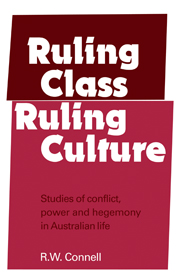Book contents
- Frontmatter
- Contents
- Table and Figures
- Preface
- Acknowledgements
- 1 Approach to class analysis
- 2 The idea of class in Australian social science
- THE RULING CLASS
- THE RULING CULTURE
- 7 Class consciousness in childhood
- 8 Class and personal socialization
- 9 The media and middle-class culture
- 10 The pattern of hegemony
- Notes
- Index
9 - The media and middle-class culture
Published online by Cambridge University Press: 05 January 2012
- Frontmatter
- Contents
- Table and Figures
- Preface
- Acknowledgements
- 1 Approach to class analysis
- 2 The idea of class in Australian social science
- THE RULING CLASS
- THE RULING CULTURE
- 7 Class consciousness in childhood
- 8 Class and personal socialization
- 9 The media and middle-class culture
- 10 The pattern of hegemony
- Notes
- Index
Summary
The utility of a PAPER in the COLONY, as it must open a source of solid information, will, we hope, be universally felt and acknowledged. We have courted the assistance of the INGENIOUS and INTELLIGENT:- We open no channel to Political Discussion, or Personal Animadversation:- Information is our only Purpose; that accomplished, we shall consider that we have done our duty in an exertion to merit the Approbation of the PUBLIC, and to secure a liberal Patronage to the SYDNEY GAZETTE.
Thus the statement of aims in volume 1, number 1 of Australia's first newspaper. The author-editor did interpet the ‘no politics’ rule strictly when it came to criticisms of the colonial government, as was appropriate to a semi-official publication censored by the governor's secretary, but a trifle less so when it came to the convicts. Any who showed a spirit of resistance immediately became, to the paper, ‘ruffians’, ‘desperados’, ‘atrocious criminals’, ‘banditti’, and ‘villains’ of the deepest dye.
When an opposition press appeared in the 1820s, not only able but energetically willing to criticize the colonial government, the official monopoly of mass communication ended. The social assumptions, however, changed little: respectability, public order, and private property continued to be basic. Such themes can be traced, with variations in detail but an overriding harmony, through all the great organs of the colonial press, the Sydney Morning Herald, the Adelaide Register, the Melbourne Age.
- Type
- Chapter
- Information
- Ruling Class, Ruling Culture , pp. 190 - 204Publisher: Cambridge University PressPrint publication year: 1977



